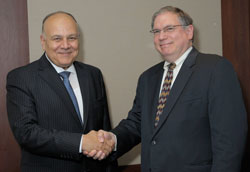Arab Spring provides new opportunities for US collaborations with Egypt
July / August 2011 | Volume 10, Issue 4

Photo by Bill Branson
Egypt is poised for a scientific renaissance
with a plan to more than double its research
investment. The country’s new science
minister, Dr. Amr Salama, met recently with
Dr. Lawrence Tabak, NIH principal deputy
director, to discuss ways to increase
collaboration between Egypt and the U.S.
Egypt is poised for a scientific renaissance with a plan to more than double its research investment over the next four years, according to the country’s science minister, who visited NIH recently to meet with senior leaders.
"Egypt is moving toward a new era," said Dr. Amr Salama, Egypt’s Minister of Higher Education, Scientific Research and Technology. "We have a strategic geographic location, a well-educated population and robust research facilities. We are prepared to become one of the world’s leading research centers."
He asked for help in achieving that goal, calling for America to open its doors to scientists from Egypt’s universities and research centers so they can enhance their capabilities and form collaborations that will benefit both partners.
"We have much to learn from each other and look forward to increasing interactions with Egyptian scientists," agreed Dr. Lawrence Tabak, NIH principal deputy director.
Salama assured NIH officials the recent change in government has not disrupted his country’s biomedical research enterprise. "Everything is running normally at Egypt’s universities and research centers," he said. "Everyone is excited and optimistic about the future."
To drive Egypt’s economic recovery, the new government intends to increase its budget for education, scientific research and health from .7 percent of the Gross Domestic Product to two percent by 2015. "This is a clear indication that research is a priority," he said.
Salama is the country’s official representative to the World Health Organization, a sign of the importance he places on health and research. In most cases, it is the minister of health who plays that role.
Egypt’s most urgent health concern is combating the hepatitis C virus, which infects more than 10 percent of the population, Salama said. Other priorities include addressing its high rate of colorectal and childhood cancers and schistosomiasis, a parasitic infection endemic in Egypt.
To spur investigations in these and other areas, Salama plans to upgrade research facilities; improve IT infrastructure and data mining capabilities; increase salaries for faculty so they can dedicate more time to research, and bolster science and math education. In addition, he would like to encourage more short- and long-term scientific exchanges - including increasing the number of visiting Egyptian scientists at NIH from the current nine. He’d also like to expand the ongoing NIH collaborations with his country, which include bioethics and trauma research training; studies of youth drug abuse, and investigations of bladder, breast and liver cancer. Finally, he is requesting Egypt be given open access to scientific journals, as was granted to Iraq through the Iraq Virtual Science Library.
Expansion of Egypt’s biomedical research enterprise will benefit the entire region, Salama noted. Egypt helped establish the African Network for Drug and Diagnostic and Innovation, a consortium of 52 African nations intended to promote and sustain African-led product innovation through the discovery, development and delivery of affordable new tools. Egypt, as one of the top three research producers in the continent, plays a leading role.
"We are interested not only in engaging with more Egyptian scientists directly, but also in working to integrate them into NIH efforts in Africa to strengthen scientific capacity throughout the continent," said Fogarty director Dr. Roger I. Glass.
The Arab Spring has re-energized Egypt’s research community, Salama said, and created new opportunities for international exchange and innovation.
"We have the vision to apply scientific solutions to our society’s health needs and to support a knowledge-based country," he explained. "With our enhanced investment - together with the wisdom and guidance from our U.S. partners - we will see a new Egypt."
To view Adobe PDF files, download current, free accessible plug-ins from Adobe's website.
To view Adobe PDF files,
download current, free accessible plug-ins from Adobe's website.
Related World Regions / Countries